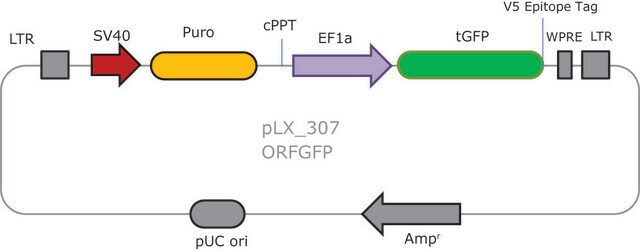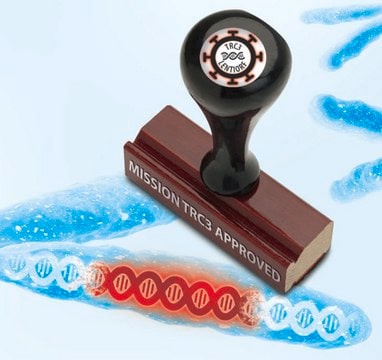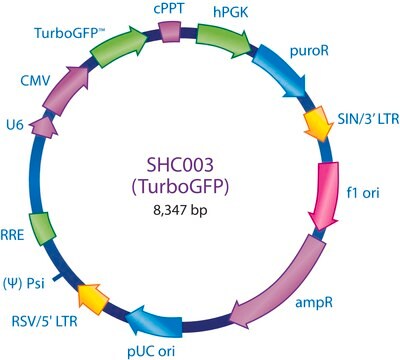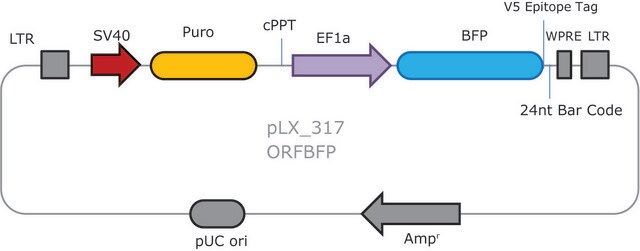ORFGFPH
MISSION® TRC3 ORF GFP Lentivirus High Titer Control
Faça loginpara ver os preços organizacionais e de contrato
About This Item
Código UNSPSC:
41106609
NACRES:
NA.51
Produtos recomendados
embalagem
vial of 200 μL
Nível de qualidade
concentração
5x108 VP/ml (via p24 assay)
aplicação(ões)
genome mapping
genomic analysis
Condições de expedição
dry ice
temperatura de armazenamento
−70°C
Categorias relacionadas
Descrição geral
The MISSION TRC3 ORF GFP Lentivirus High Titer Control Transduction Particles contain an ORF insert expressing TurboGFP™, and is useful as a positive (or negative control) in experiments using the MISSION TRC3 LentiORF Library Collection in arrayed or pooled format, including our latest Whole Genome LentiORF Pool. TurboGFP is an improved variant of the green fluorescent protein copGFP cloned from copepoda Pontellina plumata.
The TurboGFP ORF control transduction particles are produced from the sequence-verified lentiviral plasmid, pLX307-puro-TurboGFP (ORFGFP). This positive control can be used for measuring transduction efficiency and optimizing ORF delivery in cell lines that do not survive any puromycin exposure. The GFP Control contains a gene encoding TurboGFP driven by the EF1a promoter. This control provides fast visual confirmation of successful transduction. Ampicillin and puromycin antibiotic resistance genes provide selection in bacterial or mammalian cells respectively.
Unlike murine-based MMLV or MSCV retroviral systems, lentiviral-based particles permit efficient infection and integration of the construct into differentiated and non-dividing cells, such as neurons and dendritic cells, overcoming low transfection and integration difficulties when using these cell lines. Self-inactivating replication incompetent viral particles are produced in packaging cells (HEK293T) by co-transfection with compatible packaging plasmids.
In addition, the Control Transduction Particles are pseudotyped with an envelope G glycoprotein from Vesicular Stomatitis Virus (VSV-G), allowing transduction of a wide variety of mammalian cells. 200 μl of 5x108 TU/ml (via p24 titering assay) lentiviral particles are provided as frozen stock.
This high titer offering is recommended for customers: who need to utilize smaller volumes of virus, who have very difficult to transduce cell lines, or who need to transduce large numbers of cells.
When conducting experiments using MISSION TRC3 ORF clones, the proper controls should be a key element of your experimental design to allow for accurate interpretation of gene and protein expression results. The MISSION Control Transduction Particles are a critical positive control to monitor transduction efficiency.
To see application data, protocols, vector maps, and more visit the TRC3 information page.
The TurboGFP ORF control transduction particles are produced from the sequence-verified lentiviral plasmid, pLX307-puro-TurboGFP (ORFGFP). This positive control can be used for measuring transduction efficiency and optimizing ORF delivery in cell lines that do not survive any puromycin exposure. The GFP Control contains a gene encoding TurboGFP driven by the EF1a promoter. This control provides fast visual confirmation of successful transduction. Ampicillin and puromycin antibiotic resistance genes provide selection in bacterial or mammalian cells respectively.
Unlike murine-based MMLV or MSCV retroviral systems, lentiviral-based particles permit efficient infection and integration of the construct into differentiated and non-dividing cells, such as neurons and dendritic cells, overcoming low transfection and integration difficulties when using these cell lines. Self-inactivating replication incompetent viral particles are produced in packaging cells (HEK293T) by co-transfection with compatible packaging plasmids.
In addition, the Control Transduction Particles are pseudotyped with an envelope G glycoprotein from Vesicular Stomatitis Virus (VSV-G), allowing transduction of a wide variety of mammalian cells. 200 μl of 5x108 TU/ml (via p24 titering assay) lentiviral particles are provided as frozen stock.
This high titer offering is recommended for customers: who need to utilize smaller volumes of virus, who have very difficult to transduce cell lines, or who need to transduce large numbers of cells.
When conducting experiments using MISSION TRC3 ORF clones, the proper controls should be a key element of your experimental design to allow for accurate interpretation of gene and protein expression results. The MISSION Control Transduction Particles are a critical positive control to monitor transduction efficiency.
To see application data, protocols, vector maps, and more visit the TRC3 information page.
Aplicação
Functional Genomics/Overexpression Screening/Target Validation
Nota de preparo
Puro Kill Curve and Determining CFU (Colony Formation Unit) per mL. Prior to performing a library-scale screening, two preliminary experiments must be conducted. Visit the Lentiviralpool Information Page or refer to the technical bulletin.
Informações legais
Use of this product is subject to one or more license agreements. For details, please see the MISSION License Page.
MISSION is a registered trademark of Merck KGaA, Darmstadt, Germany
TurboGFP is a trademark of Evrogen Co.
produto relacionado
Nº do produto
Descrição
Preços
Código de classe de armazenamento
12 - Non Combustible Liquids
Classe de risco de água (WGK)
WGK 3
Ponto de fulgor (°F)
Not applicable
Ponto de fulgor (°C)
Not applicable
Certificados de análise (COA)
Busque Certificados de análise (COA) digitando o Número do Lote do produto. Os números de lote e remessa podem ser encontrados no rótulo de um produto após a palavra “Lot” ou “Batch”.
Já possui este produto?
Encontre a documentação dos produtos que você adquiriu recentemente na biblioteca de documentos.
Nossa equipe de cientistas tem experiência em todas as áreas de pesquisa, incluindo Life Sciences, ciência de materiais, síntese química, cromatografia, química analítica e muitas outras.
Entre em contato com a assistência técnica








